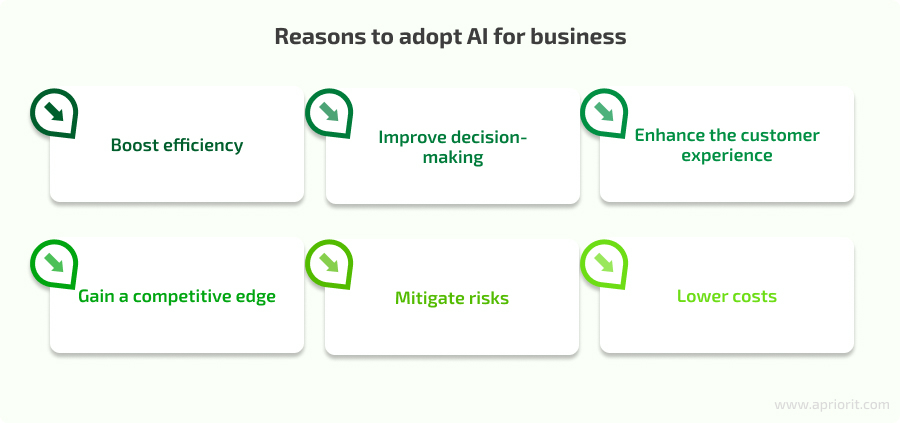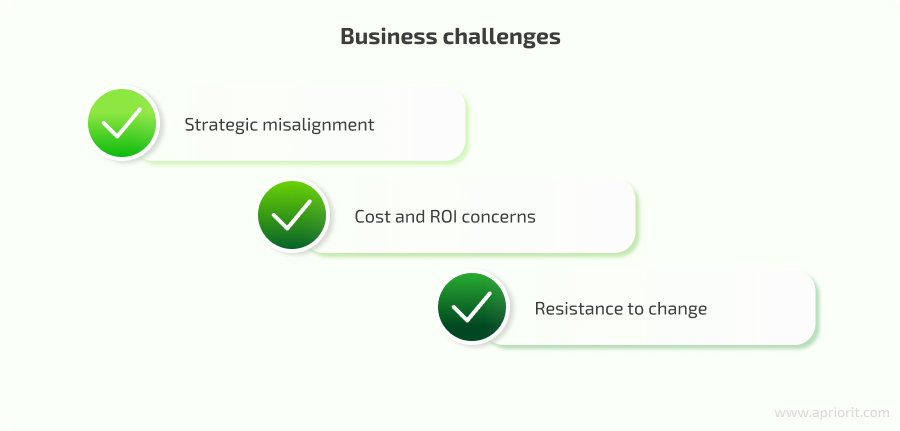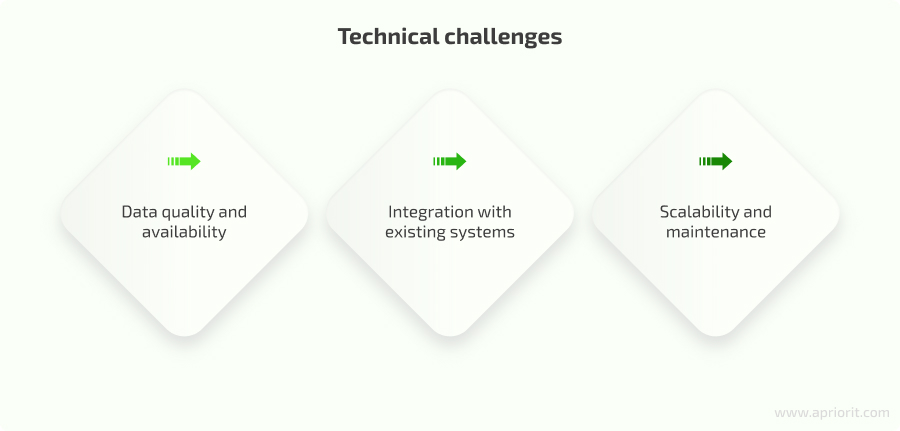Artificial intelligence (AI) continues to find applications in various industries, from healthcare to finance, by automating tasks, enhancing decision-making, and unlocking new opportunities for growth. There is a lot of transformative potential in AI, as it allows businesses to innovate, improve their efficiency, and gain a competitive edge.
However, AI adoption is associated with many challenges, including integrating AI with legacy systems, ensuring data privacy, and mitigating biases in AI algorithms. Organizations often struggle with the complexity of AI implementation and the scarcity of skilled talent. These issues can lead to significant setbacks if not addressed properly.
To fully harness the benefits of AI adoption while mitigating its risks, organizations must adopt a proactive and strategic approach. This article focuses on the key risks associated with AI adoption and actionable strategies to address them. By understanding these challenges and implementing effective measures, you can safely adopt AI in your business operations.
This article will be useful for software development project leaders who are considering integrating AI into their operations but have concerns about doing so safely and efficiently.
Why should your business embrace AI?
AI adoption offers several compelling advantages for businesses looking to stay competitive and innovative. Here are key reasons why companies are increasingly turning to AI:

- Boost efficiency. AI can assist with automating routine tasks, allowing employees to focus on strategic activities. This leads to increased productivity and faster turnaround times.
- Improve decision-making. AI tools can help your software quickly analyze vast amounts of data, providing insights that help business owners make informed decisions.
- Enhance the customer experience. Consider using AI to tailor your products and services to individual customer preferences. By offering more relevant and timely solutions, you can enhance customer satisfaction and loyalty.
- Gain a competitive edge. Businesses that leverage AI are able to develop innovative products and services, outpace competitors, and capture new market opportunities.
- Mitigate risks. AI can be used to detect fraud, predict potential issues, and identify anomalies, allowing you to protect your operations.
- Lower costs. By automating processes and optimizing resource use, AI allows for reducing operational costs. Over time, these savings can significantly impact a company’s bottom line.
To explore more industry-specific benefits of AI, check out our article dedicated to generative and predictive AI.
As companies rush to integrate AI, it’s important to understand the complexities and risks of AI adoption.
NUnlock the potential of AI for your business!
Let’s work together to create AI-driven innovations that set you apart.
Risks and roadblocks in AI adoption
While AI offers significant benefits, adopting it successfully comes with challenges. To avoid potential problems with AI adoption, you need to clearly understand what specific issues AI can solve. AI should be considered when it offers a unique advantage, such as for automating complex tasks or finding hidden patterns in large datasets. Let’s take a look at what AI adoption challenges you can encounter on your journey.
Business-level challenges
Integrating AI into business operations promises immense potential, but it also presents a range of challenges that organizations have to navigate to successfully adopt AI in their projects.

Strategic misalignment — there is a lack of a clear AI strategy that is aligned with overall business goals.
- Problem: Many companies rush into AI adoption without considering how AI fits into their broader goals. This can lead to wasted resources and inefficient processes.
- Solution: Develop a well-defined AI strategy that connects with your business goals. This strategy should not only outline how AI will be used but also involve key stakeholders in the planning process.
A strategic approach will help you better allocate resources and prioritize AI projects with the highest potential impact.
Cost and ROI concerns — significant upfront investments are required in technology, infrastructure, and talent.
- Problem: Quantifying the ROI of AI initiatives can be difficult. Along with the initial costs, this may deter businesses from fully committing to AI.
- Solution: Adopt a phased approach. Start with pilot projects to demonstrate the value of AI and build a business case for larger investments. Focus on measuring both tangible and intangible benefits such as improved efficiency, better decision-making, and increased customer satisfaction.
This approach helps build confidence in AI’s value proposition and can lead to more significant investments as initial benefits become clearer.
Resistance to change — AI can disrupt existing workflows and processes.
- Problem: Employees may fear losing their jobs or needing to learn new skills, which can create a significant implementation barrier, slow down AI adoption, and limit its impact.
- Solution: Create and implement a comprehensive change management strategy. Open communication about AI’s benefits, along with proper training and support, can help ease these concerns.
Engaging employees in the AI journey can help to build buy-in and ensure a smoother transition.
Related project
Building AI Text Processing Modules for a Content Management Platform
Discover how Apriorit helped an international content management provider enhance their platform with advanced AI-powered text processing capabilities. Our experts offer valuable insights into the development process and the benefits of implementing AI in content management.

Technical issues
While business challenges are significant, technical barriers to AI adoption also play a big role in slowing down this process.

Data quality and availability — AI systems rely on high-quality, relevant data to function effectively.
- Problem: You might face challenges with data quality, such as data inconsistencies, missing values, or biases. Collecting and organizing enough data can be time-consuming and resource-intensive.
- Solution: Invest in strong data management practices, including data cleaning, validation, and enrichment. Focus on data governance to ensure both data quality and security.
By prioritizing data quality and availability, you can build a solid foundation for AI, making sure your models are trained on reliable data.
Integration with existing systems — there might be work complexity and risks of high costs.
- Problem: Legacy systems often lack the flexibility and scalability required for AI applications, which can slow down adoption and cause compatibility issues.
- Solution: Carefully assess current systems to identify integration points and potential challenges. Start with a phased approach, integrating AI into low-risk areas first to reduce risks and ensure a smooth transition.
Cloud-based AI solutions can also make integration easier by providing a flexible and scalable platform.
Scalability and maintenance — you need to meet growing demands over time while ensuring the same level of efficiency.
- Problem: As AI models get more complex, they require more computational resources. Maintaining AI systems over time also necessitates regular updates, monitoring, and retraining.
- Solution: Design your AI solutions with scalability in mind, and use modular architectures and cloud-based infrastructure to support growth. Establishing a maintenance plan that includes regular updates, performance monitoring, and allocation of dedicated resources for AI upkeep is also critical.
By planning for scalability and maintenance from the start, you can maximize the long-term value of your AI investments. An expert AI development team can plan for your future growth and implement opportunities for scalability during the development process.
Read also
How AI Chatbots Can Transform Your ERP System
Explore the transformative power of AI chatbots in enterprise resource planning (ERP) systems. We share practical use cases across different industries and discuss how integrating AI chatbots can streamline operations, boost efficiency, and enhance the user experience.

Ethical and regulatory risks
The rapid growth of AI has raised ethical and regulatory concerns that you need to address to build trust and make sure that you develop and use AI systems responsibly.

Bias and fairness — AI systems trained on data that is not sufficiently representative can inadvertently contain biases.
- Problem: Algorithms can amplify biases, leading to unfair outcomes. For example, facial recognition systems might show racial bias, and hiring algorithms could favor certain groups.
- Solution: Prioritize diverse and inclusive data sets for AI training. Implement fairness metrics and test AI systems for biases to catch and fix these issues.
Your team needs to understand the importance of unbiased and comprehensive datasets and how to work with them.
Regulatory compliance — laws and regulations covering AI use evolve and may introduce new restrictions and limitations.
- Problem: Companies must navigate a complex web of laws and regulations, including those related to data privacy, consumer protection, and industry-specific requirements. Non-compliance can result in hefty fines and reputational damage.
- Solution: Stay informed about relevant laws and regulations at all times. You should set up strong compliance frameworks, appoint a data protection officer, and conduct regular risk assessments. Collaborating with legal and regulatory experts can also help you maintain compliance.
By proactively addressing ethical and regulatory challenges in AI adoption, you can build trust, protect your reputation, and foster a responsible AI ecosystem.
Read also
Discover and Protect Sensitive Data Using Artificial Intelligence
Learn how AI can revolutionize your approach to discovering and protecting sensitive data. Explore our practical tips for developing advanced data protection tools and overcoming the limitations of traditional rule-based systems.

How can Apriorit help with your AI development?
Choosing the right partner for AI development can be a challenge, as the success of your AI initiatives depends on the expertise and reliability of the vendor you choose. With our vast experience developing AI solutions, we offer a competitive edge that sets us apart in the industry.
Apriorit’s AI expertise extends to:
- Initial research to find relevant tools or ready-made models
- Data preparation to ensure the quality of data and its readiness for AI modeling
- Model development to build custom AI models tailored to your specific needs
- Algorithm optimization to enhance the model’s performance and efficiency
- Ethical AI adoption to adhere to industry standards and regulations
- Deployment and integration to seamlessly implement AI solutions into your business operations
By partnering with Apriorit, you’ll gain customized solutions designed to address your specific challenges, ensuring your business needs are met with precision and expertise.
Let us be your trusted partner in unlocking the potential of AI!
Apriorit is here to help you navigate the challenges and achieve tangible results.




